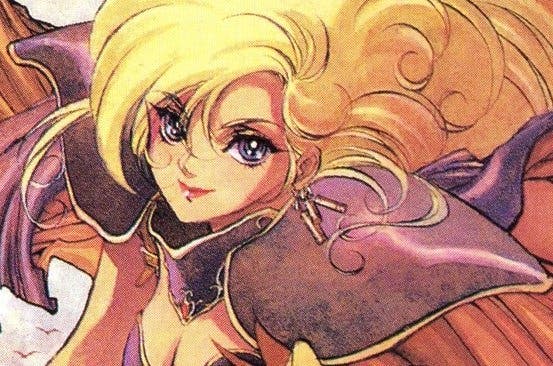Falcom vs the fans
Toshihiro Kondo Takes the stand for Falcom's biggest ever interview.
Nihon Falcom, one of gaming's oldest RPG developers, started out in 1981 programming software for the PC-88, a Japan-only home computer.
35 years on and its steadfast allegiance to the spirit of old-school software development, of which it pioneered so much in its infancy, remains strong. Its uncomplicated and inimitable design ethos makes the Falcom catalogue more easily accessible than the oft-convoluted output of their competitors, and the bubblegum anime aesthetic it's used since the 80s remains equally resolute.
But while its games may be fairly easy to get to grips with, its index of titles, conversely, has more than its fair share of bewildering pathways. Originally a dedicated PC developer, the official canon of its more successful series - the likes of Ys, Dragon Slayer and Brandish - is often a byzantine treasury of prequels, metaseries, remakes and spin-offs.
With the Trails series now Falcom's flagship IP, and chronologically one of the most confusing RPG sagas ever, the western fanbase - which has grown considerably since Falcom's move to handheld Sony consoles - are chomping at the bit to find out when the as-yet untranslated entries will get their dues.
With that in mind there was no better way to take on an interview with Falcom's president, Toshihiro Kondo - a man ever-dedicated to his company's fanbase - than by bolstering my reserved line of questioning with a no-holds-barred interrogation from the fans themselves. For those of you less ingratiated with Falcom's various series, each section of the interview is preceded by a few notes to help fill in the gaps.
Tales of Trails
Brave adventurer, prepare to enter a world where a title prefix - in this case 'The Legend of Heroes' - becomes an umbrella for a host of trilogies, duologies and sagas, collectively referred to as metaseries. You may need your wizard's cap on for this one.
Dragon Slayer: The Legend of Heroes was the sixth Dragon Slayer title, released in 1989 for the PC-88. It marked the advent of the Legend of Heroes banner, which later became an umbrella for various miniseries and metaseries taking place in different lands. The Gagharv Trilogy was the first to use the Legend of Heroes banner outside of Dragon Slayer lore, before relinquishing it to the 'Trails' brand of metaseries (known as the 'Kiseki' games in Japan).
The first in this metaseries was Legend of Heroes: Trails in the Sky, released in 2004 for Windows and then later followed by two sequels to form a trilogy. Publisher XSEED bought the rights to localise the trilogy in the west, but only released the first two entries owing to a mammoth translation task versus poorer than anticipated sales figures. As a result the localisation fate of the final chapter, Trails in the Sky: The 3rd, currently hangs in limbo.
In a bid to expand its audience, much of the Trails series has been remade for newer hardware, appearing on the PSP, Vita and PS3. The most recent western localisation is The Legend of Heroes: Trails of Cold Steel - the first of another Trails meta-trilogy - just released in the EU on PS Vita and PS3 through NIS America. XSEED has recently announced that the translation for Trails of Cold Steel II is 95 per cent complete, and it's preparing to record 11,000 lines of dialogue for it, although no release date has yet been announced.
For more information about the Trails series and its still unlocalised entries, we turned the spotlight on Mr. Kondo.
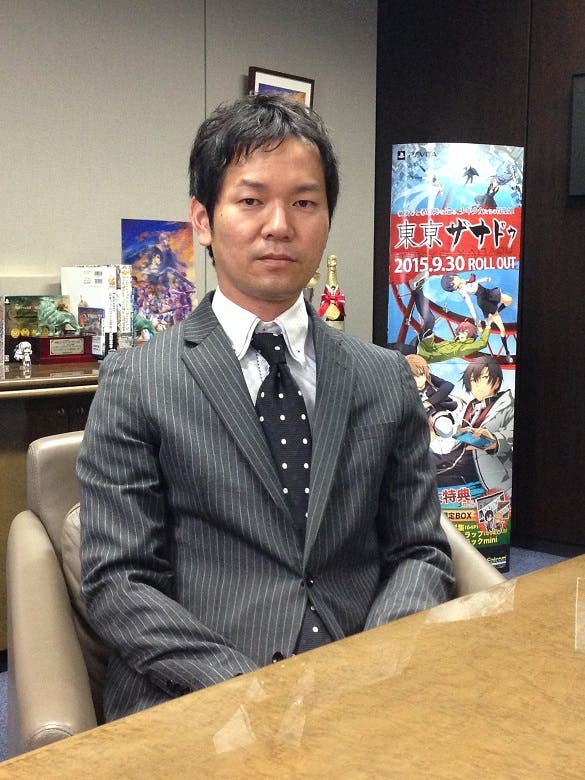
Is there a possibility of seeing Legend of Heroes: Trails of Cold Steel I & II appear on PC eventually, perhaps on Steam?
TK: I would like as many people as possible to play these games, so the possibility is definitely there.
One of the biggest complaints about Trails of Cold Steel is the English dub replacing the Japanese original, which featured famous anime voice actors. Is there a possibility of seeing the original dub released as DLC, similar to what Square Enix did with Drakengard 3?
TK: Recently, we have seen many requests for the Japanese voice track to be included. There are many issues to consider in order to make this a reality, but if the demand is really that strong, it is definitely something that we want to consider.
You used a third party to release Zero no Kiseki and Ao no Kiseki (a duology collectively known as The Legend of Heroes 7) for Windows in China, DRM free. What kind of results did you have from sales in China, do you consider it an opportune market, and do you plan to release anything else in the region?
TK: We've released titles in China regularly up till now, however it seems like the brand recognition over there is becoming greater than we had expected. There are many hurdles, but we now understand that our content matches up very well with what Chinese players want. Going forward, most of our releases will be on PlayStation platforms, however we do plan to continue to release the "Trails" and "Ys" series there.
The second chapter of Legend of Heroes: Trails in the Sky took nine years to be localised. Will Trails in the Sky: The 3rd and the aforementioned Zero no Kiseki and Ao no Kiseki (The Legend of Heroes VII) receive the same treatment, and if so do you think we can look forward to a faster localisation time?
TK: Each title in the Trails series contains a very large volume of text, so it's very common that the release takes time to localise. Every time we tell our partners how much text is in the game, they are surprised. I'm sorry to have to keep you all waiting due to these reasons. We'll do our best to make sure the titles get to you in a timely manner.
Nayuta no Kiseki (Trails of Nayuta) was only released in Japan and only on the PlayStation Portable. Is there any consideration for an enhanced port to current platforms, PC, PS4 and/or PS Vita?
TK: Falcom is a company with few people and our hands are full with new titles at the moment, but if there were a company willing to help out with the porting, it would be something I would like to make a reality. For "Nayuta" specifically, every chance we get, we reach out to those in the industry who could become potential partners.
Past
Masayuki Kato founded Falcom in 1981, later handing the reigns to current president and interviewee Toshihiro Kondo. Prior to his appointment Kondo used to be a Falcom fan who had created a website in tribute to Legend of Heroes 3: The White Witch.
Before the Legend of Heroes brand transpired, Ys once reigned as Falcom's flagship series, and was a big hit in the late 80s. Ys 1 & 2 were originally released separately but later combined, while various third-party companies (including an obscure Korean developer) obtained the rights to remake selected entries in new guises. There's also a lingering question among the fanbase about Ys protagonist Adol Christin's bromantic relationship with Dogi, his musclebound buddy, and his shunning of female attention.
For everything about Falcom and Ys in an easily digestible format, check out Eurogamer's 2013 article, Chronicles of Ys.
How exactly did the development of Ys and Ys 2 play out? Were they developed at the same time, one after the other, or was II developed in response to feedback?
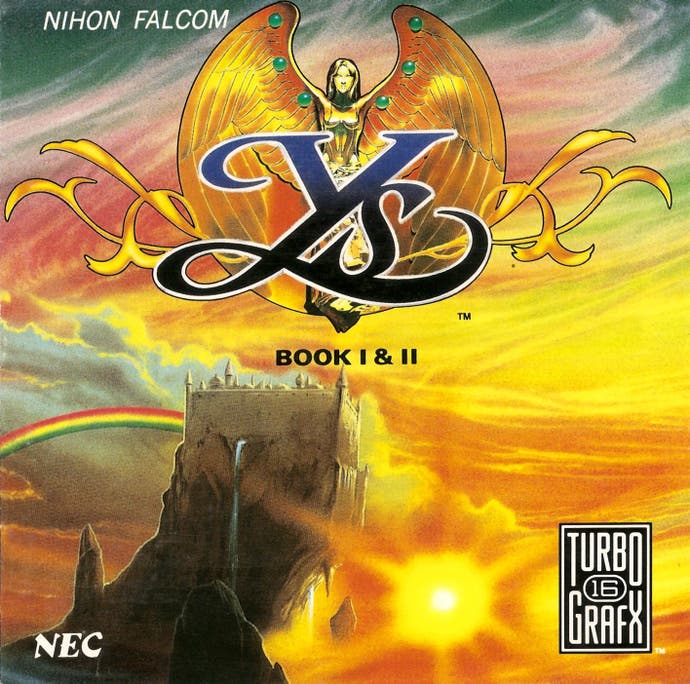
TK: At the time I was not employed here, but what I heard is, originally, they were conceived as one game, but when they actually started development the volume was so great they had to split it into two. Later on, we encountered the same situation when working on "Trails in the Sky" and thus it was split into FC and SC (First Chapter and Second Chapter - EG). I guess you could say that such events occur because we take pride and don't compromise in our development work at Falcom.
Who exactly worked on Taito's PS2 remake trilogy of Ys 3, 4 and 5, were any Falcom staff involved, and how did Taito get the licenses?
TK: Basically, all the work was done by Taito. I do remember that they consulted with us for a little help on the heroine, setting and story for 5. At the time I was working in development rather than administration, so I'm not sure of the finer details of the licensing; but I do remember that, at the time, Taito was not just interested in Ys, but also very engaged in creating content for mobile phones as well, and we received some pitches from them regarding that arena.
Because Adol has a habit of ignoring almost every female advance during the entirety of Ys - and that's a lot of advances - you must be aware of the enduring fanbase rumour that he is either asexual or homosexual. Would you be so kind as to finally set the record straight on his orientation?
TK: This is actually a topic that comes up often among the staff. One point that always gets raised is that Feena, the heroine of Ys 1, is most likely very important to Adol. It's not known whether or not Adol will have a chance to meet her again, but Adol definitely still cherishes her memory, and thus he doesn't really go for other girls' advances - is the general understanding. Adol's story is that of a wanderer and it's a given that he will have to part with the heroine at the end of the tale, so perhaps he feels it would be irresponsible to start anything with any of the girls. Furthermore, Adol is also an avatar of the player and each player holds different feelings towards the various heroines. Rather than make explicit what Adol is feeling, we would rather leave that to the player and let them enjoy their own interpretations.
You might be the only hardcore gamer who started with a fan website and then became president of the company you were championing! Can you tell us how that came to be, how you met Falcom founder Masayuki Kato, and how you managed to take over his position?
TK: I had a school assignment to create an introductory website for something, which became the fansite for "Prophecy of the Moonlight Witch" (Known as "White Witch" in Japan - EG). There was an offline gathering and I was able to meet many passionate Falcom fans. Within the group, there were some people who worked in the game industry and by talking to them, after graduation, I thought about applying at Falcom. However, I was an economics student, so I applied for a position in the finance department. Once I entered the company, because I had some experience with the internet, I was placed in a position that dealt with the web. In order to create things like game introductions and manuals, I started test playing the games. This lead me to be closer to the development team and I was able to offer my input. Afterwards, I actually was able to take a position within the development team and after some time doing project and product management I found myself as the president - the position I occupy today. Apparently, the founder of Falcom, Mr. Kato, took a look at my fansite after I joined the company and wanted to teach me many things about the company philosophy and game development.
Present
Despite fierce competition amongst several big players in the RPG market, Falcoms keep its head above water by staying sensibly small and focussing on what they know best. With old-school sentiment at its core alongside pragmatic budgeting, it's become something of a boutique RPG developer. We asked a little about what defines Falcom in Mr. Kondo's eyes.
Falcom has a very distinct brand. The aesthetic and feel of your games has managed to remain very significant throughout your history. How have you managed to retain this signature over the years?
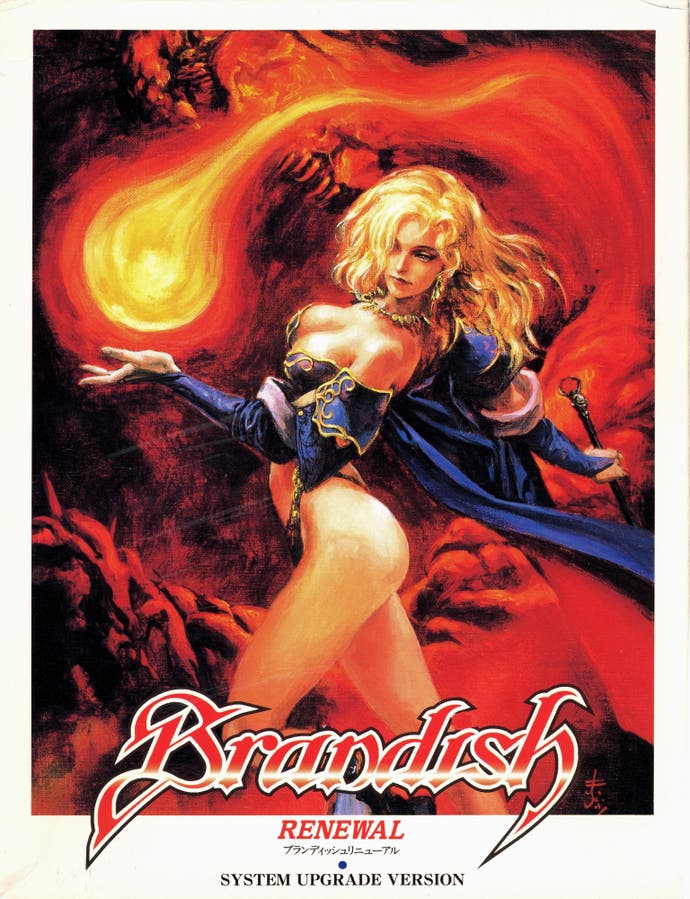
TK: Having respect for each title we release, by wanting to surpass what we have done before, by not allowing compromise, and by sharing a general desire to create something that we can be proud of. That said, we have no definite rules in regards to development.
You were once a fan, now you're the president. Would you still call yourself a gamer today? Do you still play RPGs, and are there any other games or genres you have been dabbling with recently?
TK: Recently, I generally find it hard to reach the end of RPGs, but naturally, my favourite genre is still RPGs. Also, it's not really in the same vein as what Falcom does, but I really like Uncharted. A lot of care and thought went into its creation and I think that it's a series that is easy for Japanese fans to get into.
Are you still in-touch with Falcom's founder Masayuki Kato, and what is he doing these days? Is he still into video games? I hope to hear the two of you still meet for a beer sometimes.
TK: Mr. Kato is a man with great experience and I still go to him for advice in regards to development. He's always been a person who has loved new things and still checks out new games and various new gadgets.
In any business profit is paramount, but with Falcom there's always a sense you're serving your fanbase first. Perhaps it would be fair to say you don't seem to want to be another Square-Enix, and are happy to do what you do best. Can you shed a little light on your business strategy in this regard, and tell us your personal feelings about what you want for Falcom's future?
TK: In order to continue making games, revenue and profit are very important. However, if we feel that there is no value in creating something to us personally, we will not be able to continue. Something that will delight fans. Something that we can devote ourselves to that has value. What kind of game is that? These are questions we will continue to think carefully about with each title we create.
Future
Falcom has done a lot of remake work in recent years, notably with the Ys series receiving several definitive refurbishments on the PSP and PS Vita. As such a lot of fans are interested to see others in the back-catalogue receive similar treatment, including Brandish, an action RPG that started out on the PC-98, Vantage Master, a tactical RPG never released in the west, and of course Dragon Slayer, Falcom's first ever RPG and a big hitter that appeared under many sub-headers (Dragon Slayer: Romancia, Legacy of the Wizard, and Sorcerian, to name a few that appear in this section of the interview).
Incidentally, Tokyo Xanadu, an action RPG with Persona-style traits and dungeon exploration, is Falcom's most recent domestic release. It topped the Japanese sales charts in its first week of release.
Has any third party shown an interest in bringing Tokyo Xanadu to the west?
TK: This I something that we definitely want to make a reality and are currently working towards. Please wait just a bit longer.
During the Windows XP era the PC was your primary development platform. With the success of Steam as a platform for selling niche titles, and especially with the success of XSEED's localisations, have you considered moving back to the PC as a primary platform? And if not, why not?
TK: I feel that, within Japan, there are many core gamers who want to play on consoles and we must respond to their needs. However, revenue on Steam is very good and putting not only older console titles, but new ones as well is something that we want to consider.
In the past Falcom has either focused almost exclusively on PC or console development, but at the moment you're supporting both. Has this worked out well for you, and what has this strategy revealed about your current fanbase?
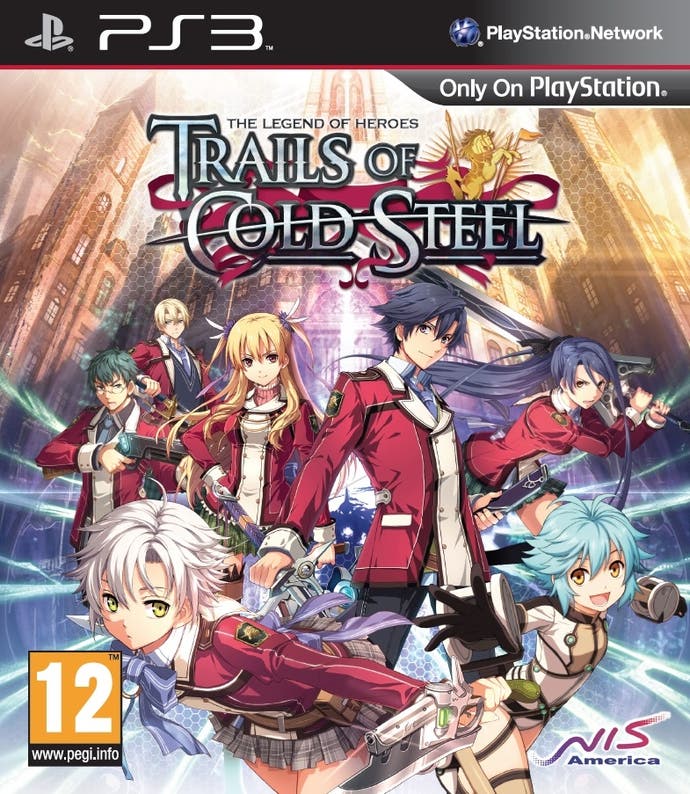
TK: When we started to release games on consoles as well, the development team gained the ability to set their sights on console gamers. Perhaps, because of that, our average user age is much younger than those players who mainly play on PC. While PC gamers are generally in their 30's, we've found that our main audience is in their 20's. Because we have not wavered in our stance on how we create games, we have maintained our old fanbase while increasing our overall userbase.
Will Brandish: Dark Revenant or any other title of the Brandish series be ported to PC and released on Steam? And are there any plans for new entries of Brandish, Lord Monarch, Vantage Master, etc?
TK: We're not at a point where can say there will be Steam version or a sequel, but this is something that I would like to make a reality. I really like Brandish!
In the last decade, you have re-made some of your older games, such as Ys III and IV, from the ground up with modern graphics and gameplay systems. Have you considered doing this with any of the older Dragon Slayer titles, such as Romancia, Legacy of the Wizard, or Sorcerian?
TK: Personally, I would like to do a remake of "Sorcerian." Recently, there have been many character-focused games and I would like to remake a game like this with such a strong gameplay focus.
Will there be a new engine for Ys 8, or will you be using the same one you've used since Ys 7 on the PSP, and can you let us know if you are planning any notable differences between the Vita and PS4 versions?
TK: Basically, "Ys 8" is a further refinement of the engine used in "Memories of Celceta" (PS Vita). As for the differences between versions, this is something that we are currently thinking of and working on implementing. Please stay tuned for more information.
Ys 5 is the last of the original series yet to receive a modern remake. Do you intend to get around to this at some point?
TK: There's really nothing I can say at this point, but, personally, I have some ideas about this. This title had blacksmithing as a theme and I would like to find a way to work that properly into the gameplay.
Gurumin eschewed most RPG components in favour of almost pure 3D action game (like a cute Devil May Cry), but otherwise Falcom tends to stay relatively close to its roots in terms of game design. Have you ever been tempted to branch out and get even more experimental, or is there a reason you prefer the comfort zone?
TK: The Gurumin team was a group of people within Falcom who got together and wanted to try something new. I also participated in this project and received a lot of inspiration. Falcom is a company with a rich history and there are many areas that should be preserved and continued. On the other hand, it's also a company that desires to try new things as well. I'd like to continue this tradition as well as continuing to make titles like "Gurumin" and "Tokyo Xanadu."
Xanadu Next was a more 'western' game than much of your output, and was darker in tone. In recent years, the Souls series has taken many elements from this game, and has seen quite some success. Has this made you consider making more games with a darker, less anime feel, or do you think you will stick to your staple lighthearted aesthetic?
TK: "Xanadu Next" was a title that I personally worked on and I still like it to this day. There are still staff members here who would like to make a sequel. Falcom has a history of making both bright as well as dark titles. There are a lot of things on our plate, so there won't be anything soon, but I'm definitely thinking of resurrecting the dark side of things as well.
Mr. Kondo, your favourite Falcom game was Legend of heroes III: The White Witch, and you even built a fan website to celebrate it. Do you have any plans to remake that game and the rest of the Gagharv Trilogy?
TK: Unfortunately, there are no plans for that at this moment. I would like to do it though. Does anyone want to give us a hand?
How did the Falcom themed costumes appearing in Dead or Alive come about, and are there any other similar collaborations you would like to do?
TK: There was a certain event where I met the producer of Dead or Alive, Yosuke Hayashi, and that's when we initially put things in motion. From there we met several times and both felt that we wanted to do some kind of cooperation. It isn't a true collaboration, but someday I would like to do another Falcom-style crossover in the vein of "Ys vs Trails in the Sky."
It's been almost 3 years since Falcom sound team jdk released the last album of their highly praised "Zanmai" series. Can we expect a new one during the next year or was "Falcom Field Zanmai" the final entry of that series?
TK: At this point, we've simply released what we had planned. Do the fans have some ideas for what kind of "zanmai" they would like next? (Answers on a postcard... or in the comments section! - EG)
For the Falcom follower there's some gold here. Mr. Kondo mentions that "going forward most of their releases will be for Sony platforms", indicating that their current focus on consoles must be proving profitable. Tokyo Xanadu appears to be on the cards for a future localisation and Steam still seems to be of particular interest to the company. One of the most lucrative tidbits could be the result of translation ambiguities or a genuine slip-up, but Mr. Kondo's note about wanting to work Ys 5's "blacksmithing theme" into the gameplay seems to be an admission that the game will actually get the remake treatment - if it's not already underway.
If one thing is certain, however, it's that Falcom is stable and evolving in the right direction. You have to admire what they stand for, the longevity it's enjoyed as a developer, and perhaps, most importantly, the things it hasn't done. Falcom hasn't conformed to the pressures of an often corrupting industry, hasn't lost sight of its identity, and hasn't undervalued the relationship with their fans.
Court adjourned.
Thank you to Mr. Kondo for his kind cooperation and all of the Falcom fans who contributed questions for the interview. You know who you are.
